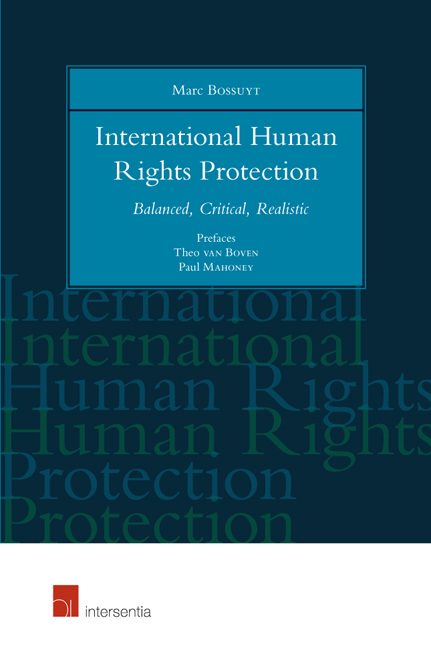Book contents
- Frontmatter
- Dedication
- Preface: A Lifetime of Fidelity and Participation
- Preface: A Penetrating and Salutary Analysis of the European System of Human Rights Protection
- Introduction
- Contents
- Epigraph
- PART ONE International Protection of Human Rights in General
- A The Normative Framework
- Chapter I The Concept of Human Rights
- Chapter II Social Rights: A Specific Category of Human Rights?
- Chapter III The Prohibition of Discrimination
- Chapter IV The Concept of Affirmative Action
- B The Institutional Framework
- PART TWO Specific Human Rights Protection
- Annex: At the Crossroads of Law and Politics
- Bibliographies
- About the Author
Chapter III - The Prohibition of Discrimination
from A - The Normative Framework
Published online by Cambridge University Press: 25 September 2018
- Frontmatter
- Dedication
- Preface: A Lifetime of Fidelity and Participation
- Preface: A Penetrating and Salutary Analysis of the European System of Human Rights Protection
- Introduction
- Contents
- Epigraph
- PART ONE International Protection of Human Rights in General
- A The Normative Framework
- Chapter I The Concept of Human Rights
- Chapter II Social Rights: A Specific Category of Human Rights?
- Chapter III The Prohibition of Discrimination
- Chapter IV The Concept of Affirmative Action
- B The Institutional Framework
- PART TWO Specific Human Rights Protection
- Annex: At the Crossroads of Law and Politics
- Bibliographies
- About the Author
Summary
In the international human rights instruments, a distinction has to be made between the discrimination clauses and the provisions containing a (more) general prohibition of discrimination.
A. THE DISCRIMINATION CLAUSES IN INTERNATIONAL HUMAN RIGHTS INSTRUMENTS
In Article 2, 1st sentence, of the Universal Declaration of Human Rights it is stated that:
“Everyone is entitled to all the rights and freedoms set forth in this Declaration, without distinction of any kind, such as race, colour, sex, language, religion, political or other opinion, national or social origin, property, birth or other status” (emphasis added).
Article 2.2 of the International Covenant on Economic, Social and Cultural Rights reads as follows:
“The States Parties to the present Covenant undertake to guarantee that the rights enunciated in the present Covenant will be exercised without discrimination of any kind as to race, colour, sex, language, religion, political or other opinion, national or social origin, property, birth or other status” (emphasis added),
while Article 2.1 of the International Covenant on Civil and Political Rights states that:
“Each State Party to the present Covenant undertakes to respect and to ensure to all individuals within its territory and subject to its jurisdiction the rights recognized in the present Covenant, without distinction of any kind, such as race, colour, sex, language, religion, political or other opinion, national or social origin, property, birth or other status” (emphasis added).
In Article 14 of the European Convention on Human Rights, discrimination is prohibited solely with respect to the rights and freedoms set forth in the Convention. Article 14 of the European Convention, like Article 2 of both Covenants, forbids discrimination only with respect to the rights “enunciated”, “recognized” or “set forth” in the treaties concerned. In other words, the prohibition is limited to the rights guaranteed by the Convention.
This is also the case with the American Convention and the African Charter. Article 1.1 of the American Convention on Human Rights, reads as follows:
“The States Parties to this Convention undertake to respect the rights and freedoms recognized herein and to ensure to all persons subject to their jurisdiction the free and full exercise of those rights and freedoms, without any discrimination for reasons of race, color, sex, language, religion, political or other opinion, national or social origin, economic status, birth, or any other social condition” (emphasis added),
- Type
- Chapter
- Information
- International Human Rights ProtectionBalanced, Critical, Realistic, pp. 33 - 42Publisher: IntersentiaPrint publication year: 2016



